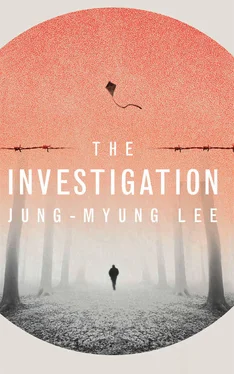OUR LOVE WAS MERELY A MUTE
Dong-ju often entered the interrogation room looking grey and pallid, as though he had been doused in ash. But he regained his vitality as I began to question him. He talked about things that didn’t exist but could be perceived, that couldn’t be seen but could be inferred, that vanished from earth but remained in memory, that he couldn’t possess but longed for. We sat facing each other. We talked not as a guard and prisoner, but as equals. We discussed writers and their tales, conversed about poets and novelists, philosophers and artists.
But the very fact that we were in this interrogation room enraged me. ‘Poetry?’ I spat out once. ‘Hope? It’s ridiculous. We’re in a barren prison.’
‘We’re waiting for spring, but maybe spring is already here,’ Dong-ju insisted, ever optimistic. ‘One realizes that spring has come and gone only when it’s summer. There’s happiness even behind these cold bars.’
‘No,’ I argued. ‘There’s nothing in this forsaken hell. There’s no beauty or virtue or intellect in this place.’
‘But we can look for it.’
‘There’s no point.’
‘If we look and we can’t find it, I guess we’ll just have to create hope and happiness and dreams and beautiful poetry. The poetry we both long for isn’t on paper. Look around you! It’s everywhere; in the narrow cells and behind the thick bars. Thanks to the thick steel that imprisons me, I can write even more heartfelt poems.’
I hoped that was true.
‘After I came here, I gave up on poetry for a while,’ Dong-ju confessed.
‘How were you able to write again?’
‘Sugiyama — I had Sugiyama,’ Dong-ju said, looking pained. ‘Without him, I wouldn’t have been able to write again.’ He suddenly looked very old.
I wanted to lighten the mood. ‘I have a question about your poem “The Blowing Wind”. You say, “I haven’t loved a single woman.” Are you saying you’ve never loved anyone?’ Although I’d read many of Dong-ju’s poems, I hadn’t come across a single poem about love. Had he truly never loved anyone? There had to have been a happy period in his life, when he’d been able to laugh, sing and love.
‘Everyone has secrets,’ he answered obliquely. He frowned, gave me an embarrassed smile and began to recite a poem. ‘“The Temple of Love.” Suni, when did you come into my temple? / When did I enter yours? / Ours is / A temple of love steeped in old customs. / Suni, lower your crystal eyes like a doe. / I will groom my tousled hair like a lion. / Our love was merely a mute. / Ah, youth! / Before the weak flame on the holy candlestick extinguishes / Suni, run towards the front door. / Before darkness and wind slam into our window / I will carry my eternal love for you / And disappear through the back door. Now / You have a cosy lake in the woods, / And I have steep mountains.’
I stopped transcribing the poem and laid down the pencil stub. ‘Is it still love if you can’t say “I love you”?’
I thought of Midori. In front of her I was a mute. She didn’t know of the passionate feelings roiling in my heart. Or maybe she knew, but pretended not to.
Dong-ju’s voice broke me out of my reverie. ‘No, that’s still love. It may even be deeper love than the one you can talk about.’
I quickly changed the subject. ‘Suni — do you know where she is now?’
He smiled bitterly and shook his head.
For a moment I was worried that I had brought back unpleasant memories. But I realized that there was no such thing as a bad memory. All memories are precious, and even a painful one is formative. That meant that my time at Fukuoka would also become a formative part of me. When time passed, would I think of Midori in the way Dong-ju was now thinking of his girl?
He recited two more poems: ‘Boy’ and ‘Snowing Map’. ‘Boy’ depicted a boy’s passionate love for the beautiful Suni, and ‘Snowing Map’ drew a boy’s pain as he said farewell to his beloved Suni one winter morning. All three poems traced the tale of meeting a girl, falling in love and parting. Did Dong-ju really love a girl named Suni? Was she real? I couldn’t ask. I was afraid Dong-ju wouldn’t remember. I didn’t want to confirm that his memories were rusting, crumbling, vanishing.
He looked famished, not from his physical starvation, but from a deeper hunger in his soul. ‘Can I read The Notebooks of Malte Laurids Brigge just once?’ His voice broke.
I understood. Some books had the power to heal illness and provide the essence of life. I had experienced that myself when I took comfort in the bookcases in our bookshop. Would The Notebooks of Malte Laurids Brigge make Dong-ju stronger and help him recover his memories?
I ran to the inspection office and retrieved the book from his box. The yellowed pages were so faded that they might crumble at a mere touch. I returned to the interrogation room and placed the old book on the desk. With a trembling hand Dong-ju caressed the old cover, as if it were the face of a woman he’d once loved. He turned the pages slowly and stopped. I stole a glance at the page he was reading:
I think I should begin to work on something, now that I am learning to see. I am twenty-eight, and just about nothing has happened. Let’s summarize: I have written a study of Carpaccio, which is bad, a drama called Marriage that tries to prove something false by ambiguous means, and poems. But alas, with poems one accomplishes so little when one writes them early. One should hold off and gather sense and sweetness a whole life long, a long life if possible, and then, right at the end, one could perhaps write ten lines that are good. For poems are not, as people think, feelings (those one has early enough) — they are experiences. For the sake of a line of poetry one must see many cities, people and things, one must know animals, must feel how the birds fly, and know the gestures with which small flowers open in the morning. One must be able to think back to paths in unknown regions, to unexpected meetings and to partings one long saw coming; to childhood days that are still not understood, to parents one had to hurt when they brought one a joy and one did not understand it (it was a joy to someone else); to childhood illnesses that set in so strangely with so many profound and heavy transformations, to days in quiet, muted rooms and to mornings by the sea, the sea altogether, to nights travelling that rushed up and away and flew with all the stars; and if one can think of all that, it is still not enough. One must have memories of many nights of love, none of which resembled another, of screams in the delivery room and of easy, pale, sleeping women delivered, who are closing themselves. But one must also have been with the dying, have sat by the dead in the room with the open window and the spasmodic noises. But it is still not enough to have memories. One must be able to forget them, if they are many, and have the great patience to wait for them to come again. For it is not the memories themselves. Only when they become blood in us, glance and gesture, nameless and no longer to be distinguished from ourselves, only then can it happen that in a very rare hour the first word of a line arises in their midst and strides out of them.
Rilke’s sentences brimmed with passion. I knew that the same poetic passion thrummed within Dong-ju. Perhaps he understood this book intuitively because he was now close to Rilke’s age when he wrote it. I hoped I, too, would be able to comprehend it in that way at twenty-six.
Dong-ju stroked the page. And that was when it happened. The book might not be able to recognize me, but I recognized the book. I snatched it out of Dong-ju’s hands and hurriedly flipped through the pages. When I found what I was looking for, I felt as though I would faint. A barely visible line was drawn under a sentence I had read a long time ago:
Читать дальше












